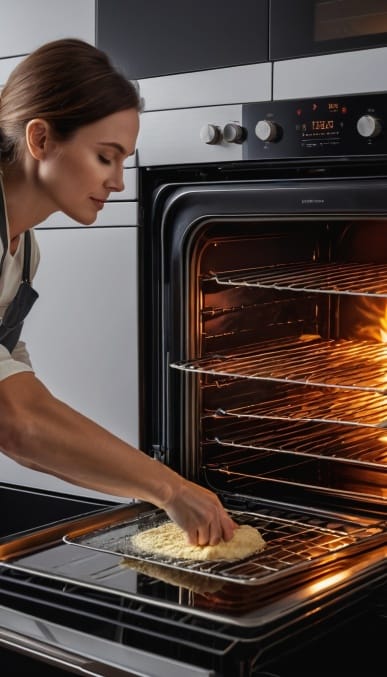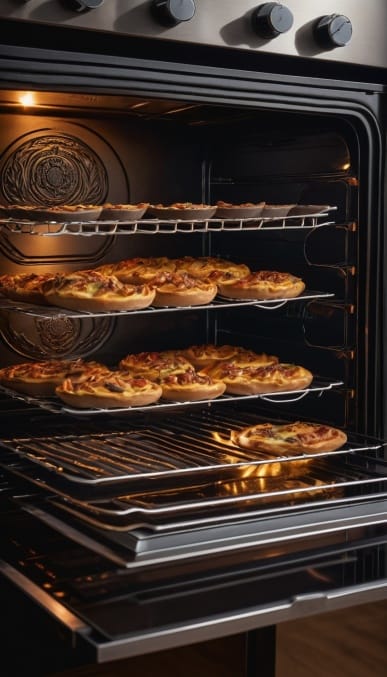
020 3608 3976
At Alesta Services, we specialize in providing thorough and effective cleaning for a wide range of ovens. Our expert team is equipped with the knowledge and tools to handle various oven types, ensuring each one receives the care it needs to perform optimally. Here’s a look at the types of ovens we clean:


1. Conventional Ovens
Conventional ovens are the most common type found in homes. They use radiant heat from the top and bottom elements to cook food. Our cleaning service for conventional ovens includes removing grease and food residue from the interior surfaces, including the heating elements and oven racks, to restore efficiency and improve cooking performance.
2. Self-Cleaning Ovens
Self-cleaning ovens use high temperatures to incinerate food residues and grease, turning them into ash. However, even self-cleaning models need periodic maintenance. We clean the oven’s interior after the self-cleaning cycle, removing any remaining ash and residue from the door, vents, and interior surfaces to ensure the oven is in peak condition.
3. Double Ovens
Double ovens feature two separate compartments, each with its own set of heating elements and controls. Our cleaning service addresses both compartments individually, ensuring that both the upper and lower ovens are thoroughly cleaned. We also pay special attention to the space between the two compartments to remove any accumulated grease and grime.
4. Range Ovens
Range ovens are integrated into a kitchen range and often come with additional features such as multiple burners and a built-in grill. We clean the oven and any associated parts, such as the grill and range top, ensuring that all components are free from grease and food residues.
5. Wall Ovens
Wall ovens are built into the wall of the kitchen, providing a sleek and space-saving design. Our team carefully cleans wall ovens, including the door, racks, and interior surfaces, to ensure that every part is spotless. Special care is taken to avoid damaging the wall-mounted installation.
6. Commercial Ovens
Commercial ovens, used in restaurants and catering businesses, often require heavy-duty cleaning due to frequent use. We handle the intensive cleaning needs of commercial ovens, addressing heavy grease buildup and ensuring that the oven operates efficiently and safely.
7. Microwave Ovens
While not always considered in-depth cleaning, microwave ovens benefit from regular cleaning to remove food splatters and odors. We offer specialized cleaning to maintain a hygienic microwave, improving its performance and extending its lifespan.
At Alesta Services, we tailor our cleaning methods to each oven type, using specialized techniques and non-toxic cleaning agents to ensure a thorough and safe cleaning process. Our goal is to leave your oven sparkling clean and operating at its best.
At Alesta Services, we take great pride in the positive experiences of our customers. Your feedback helps us continually improve and deliver the highest quality of service. We invite you to check out what our clients are saying about us on Trustpilot.
Read Our Latest Reviews
Don’t just take our word for it! Visit our Trustpilot page to see honest reviews from our satisfied customers. Their stories reflect our commitment to delivering exceptional service every time.
👉 Read Our Reviews on Trustpilot 👉
Leave Us a Review
If you’ve recently worked with Alesta Services, we’d love to hear from you! Your feedback is invaluable in helping us grow and improve. Whether you were delighted with our service or have suggestions, we encourage you to share your experience.
👉 Leave a Review on Trustpilot 👉
Your opinion matters. Thank you for being part of our journey toward excellence!
Smeg ovens are renowned for their elegant design and advanced features. Understanding the various symbols on your Smeg oven and knowing how to clean them can enhance your cooking experience and maintain your oven in top condition. Here’s a guide from Alesta Services on Smeg oven symbols and effective cleaning methods.
Common Smeg Oven Symbols
Fan Oven Symbol
This symbol resembles a fan and indicates that the oven is using the fan-assisted cooking mode. This mode ensures even heat distribution, which is ideal for baking and roasting. To clean, focus on the fan area inside the oven, ensuring it is free from grease and debris. Regularly wipe down the fan blades and the surrounding area to maintain efficient airflow.
Grill Symbol
The grill symbol, often depicted as a series of horizontal lines at the top of the oven, shows that the grill function is active. When cleaning, pay special attention to the grill element and the area directly beneath it, as these can accumulate significant grease and food splatters. A dedicated oven cleaner can help remove stubborn residue.
Bottom Heat Symbol
Represented by a line at the bottom of the oven, this symbol indicates that only the bottom heating element is active. This mode is commonly used for baking pastries. To clean, ensure that the bottom heating element and its surrounding area are free from food particles and grease.
Fan and Grill Symbol
This combined symbol shows that both the fan and the grill elements are operating. This mode is useful for grilling food with even heat distribution. Clean both the grill element and the fan area thoroughly, as grease can accumulate in both zones.
Defrost Symbol
Often shown as a snowflake, this function helps defrost frozen food. It uses the fan to circulate air without heat. While this function doesn’t involve high temperatures, it’s still important to keep the fan and surrounding area clean.
Cleaning Your Smeg Oven
Remove and Clean Racks
Start by removing the oven racks and soaking them in warm, soapy water. Use a non-abrasive scrubber to remove any grease or burnt-on food.
Clean Oven Interior
Use a non-toxic oven cleaner or a mixture of baking soda and water to clean the interior surfaces. Apply the cleaner, leave it for the recommended time, and then wipe off with a damp cloth. Be careful around the heating elements and fan.
Wipe Down Controls and Exterior
Clean the oven’s control panel and exterior with a soft cloth and mild detergent. Avoid using abrasive cleaners that could damage the surface.
Clean the Door
For the oven door, use a glass cleaner or a mixture of vinegar and water. Remove any food residue from the door seals and ensure they are dry before closing the oven.
Regular Maintenance
Regularly wipe down the interior after each use to prevent buildup and reduce the need for deep cleaning. Ensure that the oven is completely cool before starting the cleaning process.


These are some of the responses from our customers who are very satisfied

London offers a wide range of cleaning services to cater to the diverse needs of its residents, from one-off cleans to specialized cleaning tasks. While prices can vary depending on the size of the property, the complexity of the service, and the company providing the service, here’s an overview of the average cleaning costs across various services in the city.
Domestic cleaning is ideal for regular maintenance of homes, focusing on everyday tasks like vacuuming, dusting, and mopping.
End of tenancy cleaning ensures that rental properties are returned to landlords in a pristine condition. It’s often more thorough and time-consuming than regular domestic cleaning.
Professional carpet cleaning removes stains, dirt, and allergens, making carpets look and feel fresh again.
This service is designed to clean and refresh fabric sofas, chairs, and other upholstered furniture.
Window cleaning is often charged based on the number of windows or property size.
After a construction or renovation project, homes need a thorough clean to remove dust, debris, and residue.
Oven cleaning is a specialized service that removes grease and buildup from inside the oven, making it safe and efficient to use.
For homes with blocked or dirty gutters, professional gutter cleaning helps prevent water damage.
Pressure washing for patios, driveways, and exterior surfaces can remove grime, moss, and stains.
For deep or spring cleaning that’s only needed once, this service offers a complete clean of the property.

At Alesta Services, we are committed to providing top-tier cleaning services throughout London. To ensure the best experience for our clients and maintain our high standards, we follow a strict set of cleaning rules and guidelines.
Contact us today to request your free, no-obligation quote and take the first step toward hassle-free home services.